|
|
|
Sort Order |
|
|
|
Items / Page
|
|
|
|
|
|
|
| Srl | Item |
| 1 |
ID:
131351
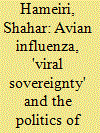

|
|
|
|
|
| Publication |
2014.
|
| Summary/Abstract |
In December 2006, Indonesian Health Minister, Siti Fadilah Supari, shocked the world when announcing her government would no longer be sharing samples of the H5N1 avian flu virus, collected from Indonesian patients, with the World Health Organization, at a time when global fears of a deadly influenza pandemic were running high. For observers of Southeast Asian politics, the decision reinforced the view of the region as made up of states determined to protect their national sovereignty, at almost all costs. This established view of the region, however, generally neglects the variable and selective manner in which sovereignty has been invoked by Southeast Asian governments, or parts thereof, and fails to identify the conditions shaping the deployment of sovereignty. In this paper, it is argued that Siti's action was designed to harness claims of sovereignty to a domestic political struggle. It was a response to the growing fragmentation and, in some cases, denationalisation of the governance apparatus dealing with public health in Indonesia, along with the 'securitisation' of H5N1 internationally. The examination of the virus-sharing dispute demonstrates that in Southeast Asia sovereignty is not so much the ends of government action, but the means utilised by government actors for advancing particular political goals.
|
|
|
|
|
|
|
|
|
|
|
|
|
|
|
|
| 2 |
ID:
141144
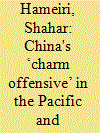

|
|
|
|
|
| Summary/Abstract |
In recent years, a perception has emerged among many policymakers and commentators that the deepening of the People's Republic of China engagement in the Pacific Islands Region, predominantly through its expanding foreign aid programme, threatens to undermine the existing regional order, in which Australia is dominant. In this article, it is argued that China's apparent ‘charm offensive’ in the Pacific is mainly driven by commercial, not political, imperatives and is far more fragmented and incoherent than is often assumed. Hence, its (real) political effects hinge, not on any Chinese strategic designs for regional domination, or even a more limited resource security agenda, but on the intent and capacity of Pacific governments to harness deepening aid, investment and trade relations with China towards their own foreign and domestic policy objectives, which include limiting Australian interference in the internal governance processes of Pacific states. This argument is demonstrated by the case of Fiji after the December 2006 military coup.
|
|
|
|
|
|
|
|
|
|
|
|
|
|
|
|
| 3 |
ID:
136950
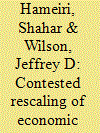

|
|
|
|
|
| Summary/Abstract |
The special issue this article opens engages with an apparent conundrum that has often puzzled observers of East Asian politics—why, despite the region's considerable economic integration, multilateral economic governance institutions remain largely underdeveloped. The authors argue that this ‘regionalism problématique’ has led to the neglect of prior and more important questions pertaining to how patterns of economic governance, beyond the national scale, are emerging in East Asia and why. In this special issue, the contributors shift analytic focus onto social and political struggles over the scale and instruments of economic governance in East Asia. The contributions identify and explain the emergence of a wide variety of regional modes of economic governance often neglected by the scholarship or erroneously viewed as stepping stones towards ‘deeper’ multilateralism.
|
|
|
|
|
|
|
|
|
|
|
|
|
|
|
|
| 4 |
ID:
178321
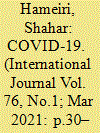

|
|
|
|
|
| Summary/Abstract |
Lockdowns and border closures to manage the ongoing COVID-19 pandemic have caused the greatest global economic shock since the Great Depression. Does this also signal the end of economic globalization, the most significant trend of the past forty years? And if so, what kind of global political economy is emerging from the wreckage? In this article, I argue that COVID-19 is mainly intensifying pre-existing trends, set in motion by the global financial crisis of 2008 and the People’s Republic of China (PRC)’s economic rise. The disruptions to global supply chains wrought by COVID-19 have combined with rising United States–PRC rivalry, growing disaffection with the distributional impacts of global value chains, and automation to catalyze the turn away from globalized production. Meanwhile, amid the economic doom and gloom, financial markets are booming, high on the central banks’ liquidity injections to which they have been addicted since the 2008 crisis. As in the decade since the 2008 crisis, booming markets will likely deepen inequality and resentment, fuelling economic nationalism and eroding support for globalization even more. The governments of relatively small and open economies, such as Australia and Canada, will need to guide their economies more purposefully or find themselves at the mercy of the increasingly confrontational, yet domestically fragile, United States and the PRC.
|
|
|
|
|
|
|
|
|
|
|
|
|
|
|
|
| 5 |
ID:
110203
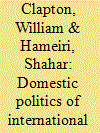

|
|
|
|
|
| Publication |
2012.
|
| Summary/Abstract |
Recent work has identified new hierarchical relationships within international society. However, few scholars have provided a satisfactory account of what informs their formation, reproduction or constitutional effects for international society. We argue that underpinning the emergence of a more hierarchical international society is a new social logic of risk, which constructs illiberal and/or fragile states as potentially dangerous sites of instability and disorder that pose particular security risks for Western states. We proceed to argue that such risk-based hierarchies are transformative of both inter-state and intra-state relations, by stripping equal political agency from 'risky' actors within and without the state. We demonstrate these claims by drawing on examples of international state building in Southeast Asia and the Southwest Pacific.
|
|
|
|
|
|
|
|
|
|
|
|
|
|
|
|
| 6 |
ID:
189240
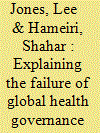

|
|
|
|
|
| Summary/Abstract |
Global health governance (GHG) was one of COVID-19's earliest victims. Soon after the novel coronavirus escaped China, the World Health Organization (WHO) was marginalized, and the International Health Regulations became practically irrelevant, as nations adopted uncoordinated, ad hoc responses. Existing explanations of GHG's collapse are largely utopian, criticizing states for failing to empower the WHO with sufficient supranational authority. This misunderstands how GHG was supposed to work in the first place and hence mistakenly diagnoses the causes of failure. We argue that COVID-19 exposed the pathologies of an entire, neoliberal approach to global governance: metagovernance and state transformation. In this approach, international organizations are hollowed out and their role shifts to metagovernance—developing and disseminating ‘best practice’ policies, institutions and rules for states to embed domestically. Such global regimes' efficacy, therefore, depends on states' capacity to enforce global disciplines. However, nation-states are also hollowed out by neoliberal strictures, undermining practical implementation. Consequently, GHG was failing long before COVID-19, leaving the system dependent on ad hoc interventions by dominant states. With the latter also affected by COVID-19, GHG was left in disarray. Reform proposals should therefore focus less on global institutions and rules and more on building domestic capabilities.
|
|
|
|
|
|
|
|
|
|
|
|
|
|
|
|
| 7 |
ID:
092133
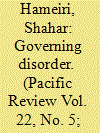

|
|
|
|
|
| Publication |
2009.
|
| Summary/Abstract |
The Australian Federal Police has in recent years become an important actor in both the implementation and design of Australian-led state building interventions in Australia's near region of Southeast Asia and the South Pacific. The article focuses on the recent expansion of the Australian Federal Police as a way of understanding the emergence of a new partly (and strategically) deterritorialized, 'regional' frontier of the Australian state. Within this new frontier, whose fluctuating outlines the Australian Federal Police not only polices but also to a considerable extent shapes and reshapes, as one of the primary expert agencies on identifying and managing transnational security risks, Australian security is portrayed as contingent on the quality of the domestic governance of neighbouring states, thereby creating linkages between the hitherto domestic governing apparatus of the Australian state and those of other countries. This allows for the rearticulation of the problems affecting intervened states and societies - indeed, their very social and political structures - in the depoliticized terms of the breakdown of 'law and order' and the absence of 'good governance', which not only rationalizes emergency interventions to stabilize volatile situations, but also delegitimizes and potentially criminalizes oppositional politics. The Australian Federal Police, however, does more than merely provide justification for intrusive state transformation projects. Its transnational policing activities open up a field of governance within the apparatus of intervened states that exists in separation from international and domestic law. The constitution of such interventions 'within' the state leaves intact the legal distinction between the domestic and international spheres and therefore circumvents the difficult issue of sovereignty. As a result, police and other executive-administrative actors obtain discretionary ordering powers, without dislodging the sovereign governments of intervened countries.
|
|
|
|
|
|
|
|
|
|
|
|
|
|
|
|
| 8 |
ID:
123618
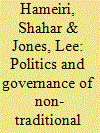

|
|
|
|
|
| Publication |
2013.
|
| Summary/Abstract |
The international security literature has recently observed the growing "securitization" of issues outside the traditional concern with interstate military conflict. However, this literature offers only limited explanations of this tendency and largely neglects to explain how the new security issues are actually governed in practice, despite apparent "securitization" leading to divergent outcomes across time and space. We argue that the rise of non-traditional security should be conceptualized not simply as the discursive identification of new threats but as part of a deep-seated historical transformation in the scale of state institutions and activities, notably the rise of regulatory forms of statehood and the relativization of scales of governance. The most salient feature of the politics of non-traditional security lies in key actors' efforts to rescale the governance of particular issues from the national level to a variety of new spatial and territorial arenas and, in so doing, transform state apparatuses. The governance that actually emerges in practice can be understood as an outcome of conflicts between these actors and those resisting their rescaling attempts. The argument is illustrated with a case study of environmental security governance in Southeast Asia.
|
|
|
|
|
|
|
|
|
|
|
|
|
|
|
|
| 9 |
ID:
167686
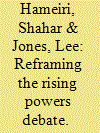

|
|
|
|
|
| Summary/Abstract |
The volume that we introduce breaks with the prevalent tendency in International Relations (IR) scholarship to treat rising powers (such as China, Russia, India and Brazil) as unitary actors in international politics. Although a neat demarcation of the domestic and international domains, on which the notion of unitary agency is premised, has always been a myth, these states’ uneven integration into the global political economy has eroded this perspective’s empirical purchase considerably. Instead, this collection advances the concept of ‘state transformation’ as a useful lens through which to examine rising power states’ foreign policymaking and implementation. State transformation refers to the pluralisation of cross-border state agency via contested and uneven processes of fragmentation, decentralisation and internationalisation of state apparatuses. The volume demonstrates the significance of state transformation processes for explaining some of these states’ most important foreign policy agendas, and outlines the implications for the wider field in IR.
|
|
|
|
|
|
|
|
|
|
|
|
|
|
|
|
| 10 |
ID:
136952
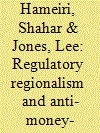

|
|
|
|
|
| Summary/Abstract |
With the intensification of the Financial Action Task Force's (FATF's) worldwide campaign to promote anti-money-laundering regulation since the late 1990s, all Asian states except North Korea have signed up to its rules and have established a regional institution—the Asia/Pacific Group on Money Laundering—to promote and oversee the implementation of FATF's 40 Recommendations in the region. This article analyses the FATF regime, making two key claims. First, anti-money-laundering governance in Asia reflects a broader shift to regulatory regionalism, particularly in economic matters, in that its implementation and functioning depend upon the rescaling of ostensibly domestic agencies to function within a regional governance regime. Second, although this form of regulatory regionalism is established in order to bypass the perceived constraints of national sovereignty and political will, it nevertheless inevitably becomes entangled within the socio-political conflicts that shape the exercise of state power more broadly. Consequently, understanding the outcomes of regulatory regionalism involves identifying how these conflicts shape how far and in what manner global regulations are adopted and implemented within specific territories. This argument is demonstrated by a case study of Myanmar.
|
|
|
|
|
|
|
|
|
|
|
|
|
|
|
|
| 11 |
ID:
083214
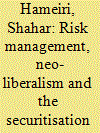

|
|
|
| 12 |
ID:
108055
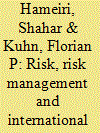

|
|
|
| 13 |
ID:
162765
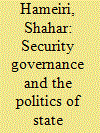

|
|
|
|
|
| Summary/Abstract |
A rapidly growing, self-identified scholarly subfield on “Security Governance” has recently emerged. Its signal contribution has been to explicate the expansion of security governance beyond traditional defense multilateralism to include diverse actors, networked transnationally across multiple scales. However, this literature is predominantly descriptive and evaluative. Lacking an explanatory theory, it struggles to explain security governance outcomes convincingly. This article advances this body of literature by presenting an explanatory theoretical framework, which sees security governance as being produced through struggles over the appropriate scale of governance and the transformation of state apparatuses, shaped by specific state-society and political economy contexts. This framework is used to explain outcomes in the governance of money laundering and terrorist financing in the Asia-Pacific region and in Africa. Contrary to the expectations of Security Governance scholars that states in these regions generally fail to engage in security governance, the case studies illustrate that significant governance innovation has in fact occurred. This innovation is not the result of supranational multilateralization, but of the transformation and partial internationalization of domestic institutions– to an extent determined by local socio-political struggles over governance rescaling. Our framework thus accounts for real world outcomes; explains, rather than merely describes, the functional efficacy of security governance regimes; and enables normative assessment by identifying the winners and losers that emerge out of governance innovation.
|
|
|
|
|
|
|
|
|
|
|
|
|
|
|
|
| 14 |
ID:
085919
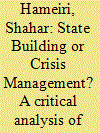

|
|
|
|
|
| Publication |
2009.
|
| Summary/Abstract |
The Regional Assistance Mission to Solomon Islands (ramsi), an Australian-led state-building intervention, has attracted considerable attention in policy-making and scholarly circles world-wide since its July 2003 inception. ramsi was lauded by the Development Assistant Committee of the oecd as a model for good practice to be followed by state builders elsewhere because of its perceived success in halting violent conflict and fostering a return to economic growth. The mission has had its critics too, but much of this criticism has centred on whether it was paying sufficient attention to the Melanesian social and cultural context. Such accounts fail to recognise that ramsi should not be viewed as a technocratic exercise in state building and capacity development by outsiders, but rather as a political project that seeks to transform the social and political relations within the Solomon Islands. This contribution critically examines the nature of this political project by focusing on the ways in which political power is (re)produced. By attempting to narrow the political choices available to Solomon Islanders, ramsi's programmes have ended up limiting the prospects for a sustainable political accommodation to emerge in the Solomon Islands. The deployment of coercive force in moments of acute crisis, as a way of managing the contradictions of attempts to build a 'state' through the production and reproduction of social and political power conducive to this project, reveals that rather than being a recipe for 'good' governance, ramsi remains a form of emergency rule.
|
|
|
|
|
|
|
|
|
|
|
|
|
|
|
|
| 15 |
ID:
175061
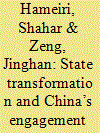

|
|
|
|
|
| Summary/Abstract |
Debates over the implications of China’s rise for global governance have reached an impasse, since evidence exists to support both ‘revisionist’ and ‘status-quo’ intentions. This means that neither is strictly falsifiable and hence the debate, as currently structured, is irresolvable. However, contradictions are explicable if we recognise that China is not a unitary state. Since the beginning of the reform era, its international engagements have been shaped by the uneven transformation – fragmentation, decentralisation and internationalisation – of state apparatuses. Contradictory international actions thus may reflect not top-down strategic direction, but conflicts, disagreements and coordination problems within China’s transformed party-state. Our state transformation approach directs us away from evaluating China’s approach to global governance in toto – whether it is overall a revisionist or status quo power – towards a detailed analysis of particular policy domains. This is because in each issue-area we find different constellations of actors and interests, and varying degrees of party-state transformation. We demonstrate the centrality of state transformation analysis for explaining the co-existence of revisionist and status quo behaviours through the apparently hard test case of nuclear technologies. Even in this ‘high politics’ domain, state transformation dynamics help explain China’s inconsistent international behaviours.
|
|
|
|
|
|
|
|
|
|
|
|
|
|
|
|
| 16 |
ID:
108063
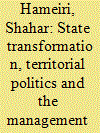

|
|
|
|
|
| Publication |
2011.
|
| Summary/Abstract |
The perceived emergence in recent years of potentially cataclysmic transnational risks has been a growing concern for policymakers and practitioners, as well as an area of considerable scholarly interest. Existing sociological approaches to the study of risk, which have become influential in a range of related social scientific fields, highlight important dimensions of this phenomenon, but are unable to adequately explain why these risk depictions have emerged at this historical juncture. Nor are they capable of providing a systematic explanation for variation in the adoption of risk depictions and related modes of governance in different functional areas and geographic regions. Drawing on the insights of political economy and critical political geography, it is argued that the current preponderance of transnational risk depictions and associated modes of governance should be understood in the context of processes of state transformation, linked to the transnationalisation of finance and production, which challenge the fit between state power and national territorial borders. From this perspective, risk and risk management are mechanisms in a contested process of rescaling, in which governance functions traditionally associated with the national state are shifted to regional or even global modes of governance. Understanding the dynamics of this territorial politics is important for learning about the current and evolving nature of political rule within and beyond the state.
|
|
|
|
|
|
|
|
|
|
|
|
|
|
|
|
| 17 |
ID:
120467
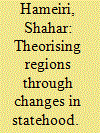

|
|
|
|
|
| Publication |
2013.
|
| Summary/Abstract |
The study of regionalism is often characterised as too fragmented, plagued by disagreements over such fundamental matters as its ontological and epistemological premises, which also hinder efforts at substantive comparison of regionalisation processes. In this article it is argued that to overcome these problems, what is required is a more rigorous incorporation of such studies within relevant work in state theory and political geography. The key insight herein is that regionalism should not be studied separately from the state as these are interrelated phenomena. State-making and regionalisation are both manifestations of contested political projects aimed at shaping the territorial, institutional, and/or functional scope of political rule. Furthermore, the article also distils the lines of a mechanismic methodology for comparative regionalism. Its main advantage is in overcoming the implicit benchmarking of regional development we find in other approaches. The framework's utility is then demonstrated through a comparison of regional governance in Asia and Europe.
|
|
|
|
|
|
|
|
|
|
|
|
|
|
|
|
| 18 |
ID:
079847
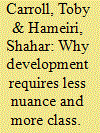

|
|
|
|
|
| Publication |
2007.
|
| Summary/Abstract |
The authors review critically an article by Patrick Kilby in Vol. 61(1) of the AJIA on Australian development policy. They claim that the difference between the Government's program and the alternatives suggested by Kilby is one of degree as his objections retain the same neoliberal limitations as AusAID and the Washington Consensus. The authors argue that reducing poverty in a globalized world means going further than institutional changes and considering the key issue of class. They instead suggest a focus on the effect of domestic international politics and the globally constituted nature of poverty.
|
|
|
|
|
|
|
|
|
|
|
|
|
|
|
|
|
|
|
|
|